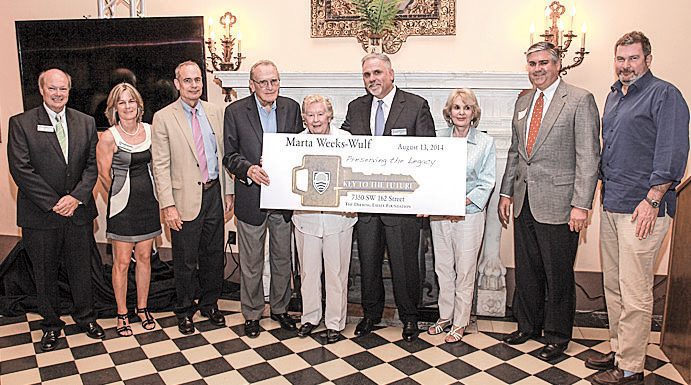
A standing-room-only crowd gathered in the historic Deering Estate at Cutler’s Stone House Ballroom and cheered when Marta Weeks-Wulf affirmed the gift of her Palmetto Bay homestead to the Deering Estate Foundation.

The 8.75-acre multi-million dollar property is located on the west edge of Old Cutler Road between SW 162nd and 164th streets adjacent to the Deering Estate. It includes more than seven acres of pristine native tropical hardwood hammock that Weeks-Wulf has managed and maintained under an Environmentally Endangered Lands (EEL) covenant, and a 10,500-squarefoot energy efficient home that she and her late husband L. Austin Weeks, petroleum geologist and former director of Weeks Petroleum, had custom built in 1982.
The Weeks’ long-established commitment to environmental conservation, along with Marta’s desire to have the hammock maintained and preserved in perpetuity, is a natural fit for the Deering Estate. For 25 years, the Deering Estate Foundation has served as the philanthropic arm of the Deering Estate at Cutler, and helped to steward the cultural and environmental resources of the 444-acre estate that is owned by the State of Florida and operated by Miami- Dade County Parks, Recreation and Open Spaces.
“It was my privilege to accept this incredible gift from someone who has generously funded many endowments, grants and projects that have impacted so many people within our community and throughout the country in the areas of the arts, education and environmental conservation,” said David A. Marley Jr., president of the Deering Estate Foundation.
Marta Weeks-Wulf is an author, an ordained Episcopal priest, the first female trustee and past chair of the Board of Trustees of the University of Miami, and a founding member of the newly established 100 Ladies of Deering. She graduated from Stanford University and holds honorary doctorate degrees from the University of Utah and the Episcopal Theological Seminary of the Southwest.
While planning to construct their dream home, the Weeks were visionaries, anticipating a world that would need to transition to renewable energy resources. The architect chosen by the Weeks was commissioned to design an active/passive solar home. Even though solar energy was not yet state-of-the-art, they incorporated solar hot water, recessed window overhangs, a heavy R factor on the roof, plus a design that created a venturi effect that pulls hot air out of the patio and upstairs windows when they were open.
Additionally, they had the house built to withstand 150 mph winds, which withstood Hurricane Andrew just a short 10 years later. The solar energy system has since been upgraded to nearly fully support the home, significantly reducing energy consumption and occasionally producing excess energy that pays forward to the power grid.
“We are honored to perpetuate the Weeks’ legacy of environmental responsibility, appreciation for higher learning and caring for our natural resources that Austin and Marta began and that she and Karl Wulf continue,” said Mary Pettit, executive director of the Deering Estate Foundation.
“The home, combined with the property, represents a tremendous addition to our community’s landscape for teaching and learning, further supporting the estate’s conservation efforts and hands-on environmental education programs.”
With its unique archaeological and geological resources, seven native Florida habitats, and opening of the Cutler Slough Rehydration/Comprehensive Everglades Restoration Plan (CERP) Project to the general public, the Deering Estate at Cutler has long defined itself as a unique natural site that has many more interesting secrets to reveal to science and resource management.
“The Weeks-Wulf property may well serve as the catalyst and lead gift to realize a long-term vision to establish a Cultural and Ecological Fields Study Station on the estate, offering a contemplative venue for conservationists and preservationists to dialogue and discourse about unique ways to preserve the rich cultural and natural resources of our community,” said Jennifer Tisthammer, newly appointed director of the Deering Estate at Cutler.”
She explained that for over a century, field stations have been important entryways for scientists to study and make discoveries about the natural world. They are centers of research, conservation, education, and public outreach. Because they lack traditional university departmental boundaries, researchers at field stations have the opportunity to converge their science disciplines with other social and empirical scientists and researchers, in ways that can change careers and entire fields of inquiry.
For more information about the Deering Estate Foundation or the Deering Estate at Cutler visit <www.deeringestate.org>, or call 305-235-1668, ext. 263.





